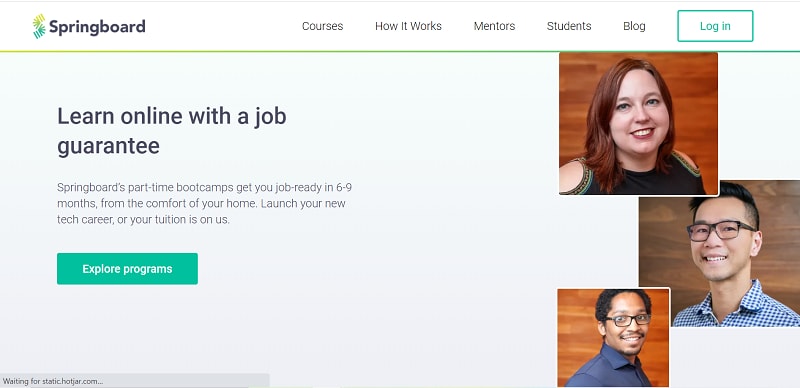

Remote-first learning deems online learning as the default mode of instruction. Right away, an important distinction should be made between “remote-first” and the widely-known “remote”. Springboard operates on a remote-first model. Three things set Springboard apart from other bootcamps. Its creation was born out of the perceived need to double down on skills training in light of the pervasive disruptions in today’s economy. Springboard was founded in 2013 by Parul Gupta and Gautam Tambay. All Springboard courses are 100% online, remote, and self-paced throughout an average of six to nine months.
Springboard bootcamp software#
Springboard’s project-based programs in areas like software engineering, data science, machine learning, and UX design are designed for working professionals who are ready to level-up or make a major career shift. Among the industry leaders is Springboard, an online learning platform that prepares students for the tech industry’s most sought-after careers. With the bootcamp wars well and truly on, a small number of bootcamps have come out ahead, proving themselves winners with both students and employers alike. This has coincided with a loss of confidence in the traditional higher education model, which has been marred by a culture of exclusivity and has steered many students toward debt and underemployment in an increasingly overeducated job market. The average bootcamp grad spent less than six months in career transition, from starting a bootcamp to finding their first job. The rise was attributed to convenient, affordable, and more career-aligned bootcamp offerings.

In 2019, nearly 35,000 students graduated from coding bootcamps, marking over a 4% rise from the previous year. With the growth in bootcamps came an increase in student enrollment.

Some 80% of these employers have gone on to hire bootcamp grads, with 99.8% saying they would willingly tap into the pool again. Demonstrating their competency, the bootcamp grads proved it was possible to gain new skills and switch careers without a university degree in hand.Īn Indeed survey conducted in 2017 found that a solid majority of employers (72%) consider bootcamp grads as “just as prepared and likely to be high performers” as candidates with college degrees. In the last five years, the bootcamp model turned this uncertainty on its head, as more and more graduates entered the workforce. Skeptics touted the bootcamp model as a flash in the pan-second-class to the traditional learning model and whose rigor and effectiveness in preparing students for future careers was not yet demonstrated. At the forefront of this movement are online learning schools and coding bootcamps whose unconventional teaching methods initially drew criticism from academics and employers alike.
Springboard bootcamp driver#
Reminiscent of the idea of ‘creative destruction,’ Harden identified technology as the main driver of disruption and innovation in the education sector.įast forward to today, students and institutions are finding themselves on the fast track to this roadmap. In 2012, Nathaniel Harden charted a roadmap for education in an article titled “The End of University as We Know It.”

“In 15 years, if not much sooner, half of the roughly 4,500 colleges and universities now operating in the United States will have ceased to exist.”


 0 kommentar(er)
0 kommentar(er)
